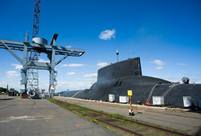

Pentagon report signals US sides with countries near S.China Sea
China's Ministry of Foreign Affairs on Thursday called on the US to abandon its "Cold War mentality" and avoid confrontation following the Pentagon's release of a new military strategy which regards states like China as a "threat" to US security interests.
The report was released Wednesday local time. The last such report was issued in 2011.
The report warns of a "low but growing" probability of the US fighting a war with a major power, which would have "immense" consequences. It also singles out disputes in the South China Sea and said that China's constructions on some islands are "adding tension to the Asia-Pacific region."
"China resolutely adheres to its path of a peaceful and defensive national security policy, which has served as the cornerstone of peace and stability in the Asia-Pacific region as well as in the world," China's foreign ministry told the Global Times in a written response.
The US should abandon its Cold War mentality, and instead should correctly perceive China's strategic intentions, the ministry said.
In a separate written reply to the Global Times, China's defense ministry said the US had made "groundless accusations" about China's rightful construction in the South China Sea and hyped up the theory of the "China threat," which the ministry opposes.
"The US should stop making irresponsible comments and put more efforts into facilitating the peaceful development of China-US military relations and maintaining regional peace and stability," the ministry said.
Policy shift
Analysts point out that the 2015 report represents a US policy shift in its stance regarding the South China Sea, from non-interference to siding with claimant countries such as Vietnam and the Philippines. Such a shift is closely linked with its "Asia pivot" strategy, analysts added.
"The last report, released in 2011, came after the US administration adopted the 'Asia pivot' strategy, when it showed concern over China's potential as an emerging power," Ni Feng, deputy director of the Institute of American Studies at the Chinese Academy of Social Sciences, told the Global Times.
"Relations between China and ASEAN countries have reached new heights in the last decade as China became the largest trading partner of the [ASEAN] countries," Ni noted. "The US is concerned about China's rising clout in the region, and intends to use the South China disputes as a way to regain its influence," he said.
The Center for Strategic and International Studies, a US think tank, said earlier that a 3,000-meter airstrip China is building on a reef in the South China Sea is nearly complete. Washington wants Beijing to halt construction and militarization in the region, said Bonnie Glaser, an expert at the US think tank, reported AFP.
The previous report, despite stating that the US should "monitor carefully China's military developments," made little mention of the South China Sea issue.
It said that the US seeks "a positive, cooperative, and comprehensive relationship with China," and discussed at length about how the two countries can cooperate on areas such as countering piracy and proliferation of weapons of mass destruction, and using China's influence with North Korea to preserve stability on the Korean peninsula.
'Two-faced'
Despite the strongly worded reference to the South China Sea, the report also said that the US "supports China's rise and encourages it to become a partner for greater international security." The US will "continue to invest in a substantial military-to-military relationship with China," the report added.
Zhang Junshe, a captain and research fellow at the Chinese Naval Research Institute, believes that the report reflects that the US is "two-faced" when it comes to its attitude toward China's military strategy.
"The US attitude toward China is different from that of Russia, as the US believes the country is challenging international norms. The report shows the US lacks understanding of China's strategic intentions," Zhang told the Global Times.
Both Zhang and Ni believe the two countries can continue building on their consensus on forming the new model of major-country relations, and expanding mutual trust in military cooperation.
China and the US have maintained a good level of military cooperation, for example by holding joint anti-piracy navy drills off Somalia in 2012.
 Creative graduation caps of ‘vigorous elves’
Creative graduation caps of ‘vigorous elves’ Hong Kong in lens
Hong Kong in lens Typhoon class strategic Submarine in photos
Typhoon class strategic Submarine in photos Hong Kong college students feel the charm of Hanfu
Hong Kong college students feel the charm of Hanfu Japan’s crimes committed against "comfort women"
Japan’s crimes committed against "comfort women" Odd news:“carrying a rod and asking to be spanked”
Odd news:“carrying a rod and asking to be spanked” Legendary life of a bee-keeping master in Hainan
Legendary life of a bee-keeping master in Hainan 4-year-old cute 'monk' spends summer holiday in temple
4-year-old cute 'monk' spends summer holiday in temple College graduates shining on the red carpet in Nanjing
College graduates shining on the red carpet in Nanjing Pledging allegiance reinforces Constitution
Pledging allegiance reinforces Constitution  Market falls amid fears about unregulated margin lending
Market falls amid fears about unregulated margin lending  Mass wedding for North Korean defectors held in Seoul
Mass wedding for North Korean defectors held in Seoul  Orthodox Church sees opportunities in China following enhanced Sino-Russian ties
Orthodox Church sees opportunities in China following enhanced Sino-Russian tiesDay|Week